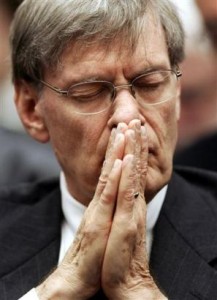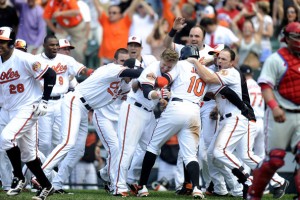Posted on
January 13, 2012 by
Dean Hybl

It appears that the prayers of baseball fans will not be answered as Bud Selig is sticking around for at least another three years.
Like a veteran player who doesn’t know when to hang up his jersey, looks like Major League Baseball Commissioner Bud Selig is determined to stick around as long as possible. Though it was originally announced that 2012 would be his final season as commissioner, Selig has now changed his mind and will remain in his role until at least the end of the 2014 season.
Shockingly (or maybe not), major league owners voted 29-1 to extend Selig’s contract for two additional years to ensure that Selig will be commissioner at least past his 80th birthday at a reported salary of $22 million per year.
Given his hubris, it seems very likely that Selig will do everything he can to remain in control of the league at least through the 2016 season as that would ensure he passes Kenesaw “Mountain” Landis for the longest tenure as commissioner in league history.
What seems strange is that while ownership considers Selig to be a great commissioner, many outside the owner’s boxes look as Selig as the epitome of all things bad about baseball.
While football had already started to eclipse baseball as “America’s Pastime” when Selig took over as interim commissioner in 1992, he seemingly has spent the last 20 years doing everything he can to ensure that baseball never gets close to retaking that title.
At the time, Selig was the owner of the Milwaukee Brewers and like the other owners in the game had tired of a commissioner whose focus was on the integrity of the sport, rather than supporting the owners and their desires.
When the owners fired Commissioner Fay Vincent, they installed Selig on an interim basis and within two years he was spearheading a battle with the players union that would eventually ensure that the World Series would be missed for the first time in 90 years.
While both sides can certainly take some of the blame for missing the World Series and the subsequent agreement that ensured that teams willing to over-spend would have a significant advantage over other teams moving forward, the fact that Selig was running the show for the owners makes him culpable for that disaster.
Between 1950 and 1994, only four teams (two of which were expansion squads) registered 10 or more consecutive losing seasons (1953-1962 Chicago Cubs, 1953-1967 Kansas City Athletics, 1969-78 Montreal Expos and the 1977-1990 Seattle Mariners). Since 1994, five teams have reached that dubious plateau (1993-2011 Pittsburgh Pirates, 1993-2004 Milwaukee Brewers, 1994-2005 Detroit Tigers, 1998-2007 Tampa Bay Rays and the 1998-2011 Baltimore Orioles). In addition, the Kansas City Royals have been below .500 in 16 of 17 seasons (2003 being their only exception), the Cincinnati Reds have been below .500 in 10 of the last 11 seasons (2010 being their only winning season when they won the NL Central) and the Colorado Rockies have had a losing record in 10 of the last 13 seasons.
Yes, there have been small market teams like the Minnesota Twins and Oakland A’s that have enjoyed occasional success, but the A’s have not had a winning record since 2006 and the Twins lost 99 games last season to illustrate that even small market teams that are able to build winning programs do not have the same ability to reload that is afforded to teams with greater revenue streams. Read the rest of this entry →









